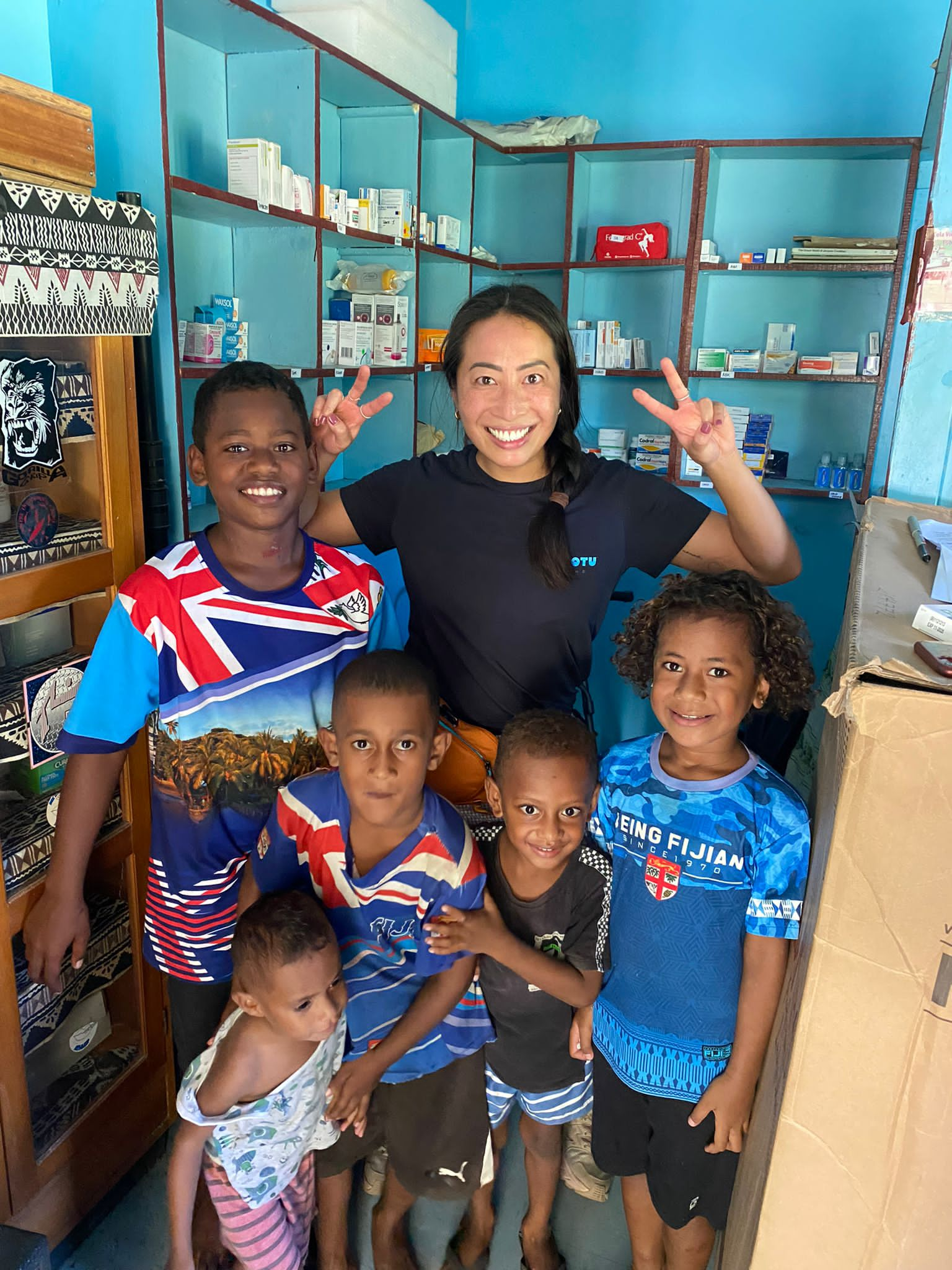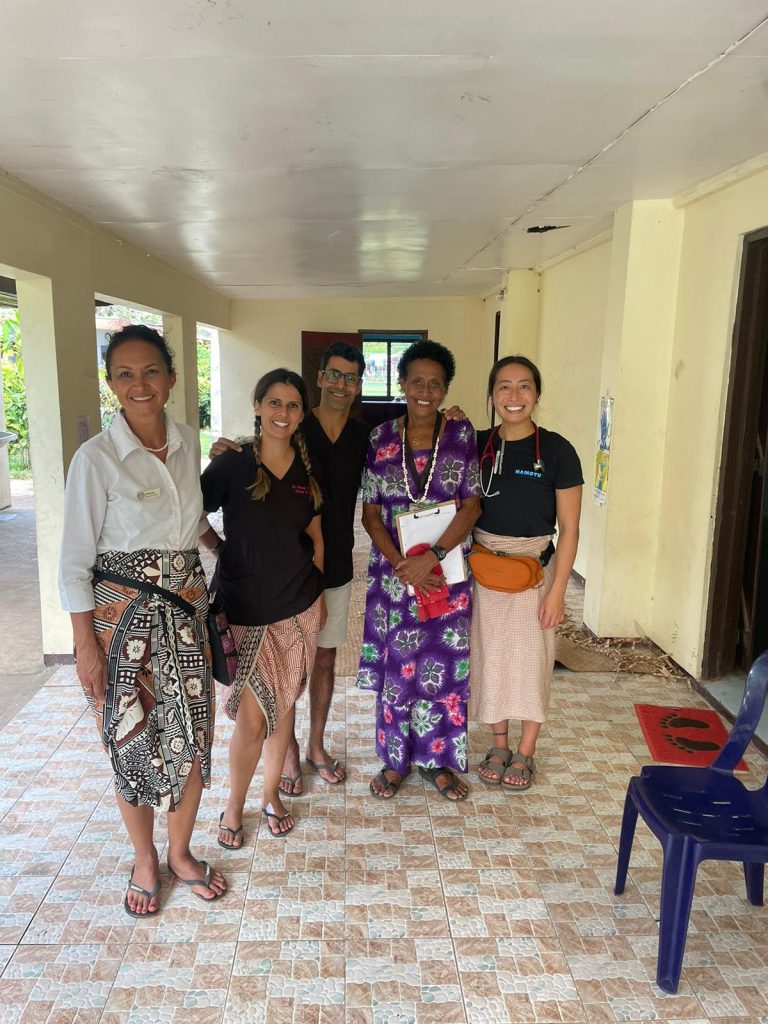
Helping others is a privilege in both senses of the word. It’s an honour and a gift, but often to assist others, we must be privileged, that is, more well-off than the recipient of our aid. But there’s more to it than that. Earlier this year, a team of local health professionals, including Bangalow doctors Meera McGarry and Irfaan Jetha, local nurse Michelle Gleeson, and Kingscliff doctor Leena Zhao headed to a remote village in Fiji to provide essential health care to the local community.
Fiji, a Pacific paradise synonymous with palm trees, beaches, and warm hospitality, is home to numerous six-star resorts. One such resort is Namotu Island, “about the size of the Bangalow sportsfields” and just 10 minutes from one of the world’s most alluring surf spots, Cloudbreak. The resort attracts many affluent tourists who come for the watersports and wellbeing, and the property is staffed predominantly by Fijians who travel to work from Nabila, a nearby village of around 250 people.
Nabila has been without a doctor for over five years. Medical treatment for the entire village has been carried out competently and with great care by nurse Merewai, now in her 60s.
While Namotu Island resort has its own medical service the staff can access, staff often work 24 days straight and then have four days off, “which is all the time they have to pursue their own health concerns,” says Michelle. Nabila is two hours from Nadi, the capital of Fiji. Transport is difficult, and work, family commitments, and cost mean many people don’t make the journey to seek the medical attention they need.

The idea for an Outreach Clinic emerged after Leena, who works as a volunteer yoga instructor and medic at Namotu, spent a night in Nabila and became aware of the significant needs there. This led to a discussion with Namotu Island resort managers who agreed to fund an Outreach Health Clinic for the village. This was the first step in making the clinic at reality. But awareness of culturally appropriate care was a high priority for the team.
“You can’t just rock on in (though many Westerners think they have license to),” says Michelle. “You must get permissions and partake in a Sebu Sebu ceremony, which is where the village chief and elders welcome you, and you make your offering to the village. In our case, it was our services and a massive amount of medical equipment, consumables and medication.”
Building a connection with the community was a crucial step to the success of the Outreach Clinic. “Taking things slowly was so important for relationship building, and developing safe, culturally appropriate care provision to the community,” says Michelle. “When the villagers realised that we were treating their families who were working at the resort, they said ‘Oh, could you please see us as well because we just haven’t had a chance?’” adds Meera.
“Nurse Merewai set us up a couple of rooms in the town hall. We had a bit of a triage system out the front to assess the urgency of the patients. We also had a little surgicaloperating area and a small pharmacy with lot of our own medication and equipment,” she says.
Some patients had minor injuries or conditions, but others were in the form of chronic but manageable illnesses that can be easily treated with appropriate prescription medicines, all of which were previously out of reach for the average villager. Priceline Pharmacy in Byron donated some medications for the trip, and Byron Bay Eyecare (owned by Bangalow’s Steve and Belle Brady) donated pre-loved prescription glasses for the villagers. “We saw a lot of people with undiagnosed diabetes or high blood pressure,” says Irfaan. “There were also many people who were overweight or obese, from consuming highly processed, high sugar Western foods rather than eating the typical Fijian diet like fish and cassava root.”
“We gave about 20 people a Boostrix injection for tetanus because people were getting reef cuts on their feet that were badly infected, and they just kept walking around working,” says Meera. “Nurse Merewai was basically holding the village together in terms of health care,” says Meera. “She has a little clinic with a bed in it, no fan, no electricity, and often no running water.”
“The health burden, particularly with diabetes and resultant advanced complications, is more than any one person can manage,” adds Michelle.
“After the clinics in the morning, we would run health education programs, women’s business one day, men’s business another day. We did geriatric health, managing muscle aches and pains, gentle exercise and stretches, and things like fall prevention. For the women, we talked about contraception and breast checks,” says Meera.
The pilot program appears to have been a success for the medical team and patients alike. “They had a cava ceremony for us, and we were all crying the day we left,” says Meera. “They are a proud community, so welcoming and joyous. Crowded living conditions, poor sanitation, waste services and limited access to quality water produce some fundamental challenges to maintaining good health,” says Michelle.
The Outreach team hope to return to the island in 2024, and that their clinic will serve as a case study that will inspire other luxury resorts to re-invest in their local community’s health. “If a pilot like this works, it’s feasible that these big resorts in developing countries can do this for their staff,” says Irfaan.
For more information about the outreach visit namotuislandfiji.com/blog/nabila-medicaloutreach loveleena.com.au/medicine If you would like to help in future outreaches, please get in touch with Dr Leena Zhou on hello@loveleena.com.au
Sally Schofield